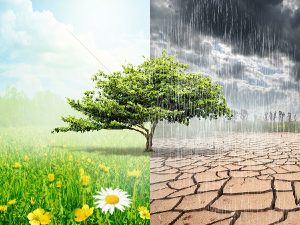Effect of Climate Change on Our Planet
Climate change refers to long-term alterations in temperature, precipitation, wind patterns, and other elements of the Earth’s climate system. These changes are primarily driven by human activities—especially the burning of fossil fuels (coal, oil, and natural gas)—which release greenhouse gases like carbon dioxide (CO₂) into the atmosphere.
Major Effects:
-
Rising Global Temperatures: Earth’s average temperature has increased significantly over the past century, leading to more frequent and severe heatwaves.
-
Melting Ice Caps and Rising Sea Levels: Glaciers and polar ice are melting at unprecedented rates, causing sea levels to rise and threatening coastal communities with flooding and erosion.
-
Extreme Weather Events: Climate change is intensifying hurricanes, droughts, floods, and wildfires, disrupting ecosystems and human lives.
-
Loss of Biodiversity: Many plant and animal species are struggling to adapt to changing temperatures and habitats, leading to extinction risks.
-
Ocean Acidification: Increased CO₂ levels are making oceans more acidic, harming marine life—especially coral reefs and shellfish.
-
Agricultural Disruption: Changing weather patterns affect crop yields and food security, particularly in vulnerable regions.

Solutions to Climate Change
Solving climate change requires collective global action across multiple levels—government, industry, and individual behavior.
1. Transition to Renewable Energy
-
Shift from fossil fuels to clean energy sources like solar, wind, hydro, and geothermal.
-
Invest in energy efficiency in homes, industries, and transportation.
2. Sustainable Transportation
-
Promote electric vehicles, public transport, biking, and walking.
-
Improve fuel efficiency and adopt alternative fuels like biofuels or hydrogen.
3. Reforestation and Conservation
-
Protect existing forests and plant new trees to absorb CO₂.
-
Restore degraded lands and support biodiversity conservation efforts.
4. Reduce Waste and Promote Recycling
-
Minimize single-use plastics, compost organic waste, and recycle materials.
-
Support circular economy practices that reduce consumption and waste.
5. Climate-Friendly Agriculture
-
Adopt regenerative farming practices that build healthy soil and sequester carbon.
-
Reduce methane emissions from livestock and promote plant-based diets.
6. Climate Policy and Education
-
Enact and enforce international agreements (like the Paris Agreement) to limit emissions.
-
Educate communities about climate change and empower grassroots solutions.
Conclusion
Climate change is one of the most pressing challenges of our time, affecting every part of the planet. However, we still have the opportunity to reduce its impact through smart choices, innovation, and global cooperation. Each action—no matter how small—contributes to building a more sustainable and resilient world for future generations.


